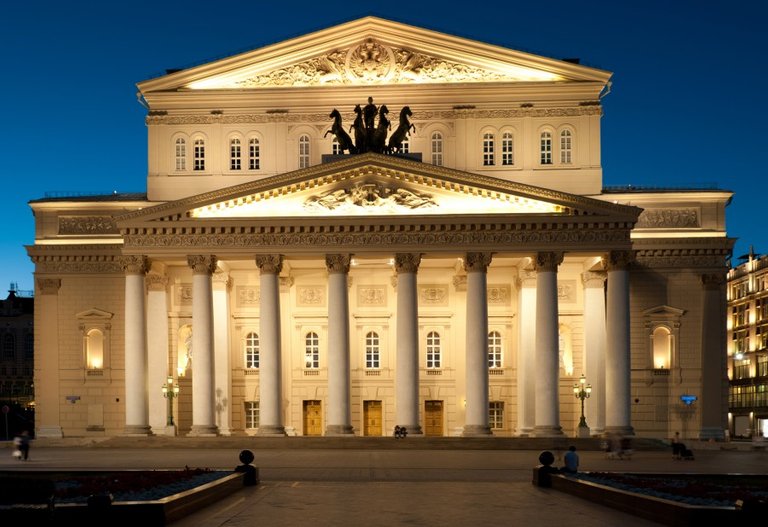
Source: http://www.classicalmusicnews.ru/news/u-bolshogo-teatra-poyavilsya-videokanal/
Some words about it...
Bolshoi Theatre is one of the world's famous theaters with its own colourful story filled with tears, smiles, great perfomances and masterful people, who took part in its history. Its situated in Moscow, Russia between subway stations "Ohotnyi Ryad" and " Teatral'naya".
Origins of theatre.
In its origin, Bolshoi Theatre was a private theatre of the Moscow proseсutor Prince Pyotr Urusov. Catherine the Great ( wife of emperor Pyotr III) granted Prince Urusov the privilege to organize theatre performances, masquerades, balls and etc for a period of ten years. The Theatre's first building was built in a six month on Petrovka Street, so it derived its name Petrovsky. The Theatre was opened on 30 December 1780. The opening performance consisted of a solemn prologue The Wanderers written by Alexander Ablesimov and a big pantomime ballet The Magic School, produced by Leopold Paradis to music by Joseph Starzer.
Organizating perfomances cost a lot of money and heavily stroke on finances, thats why Prince Urusov decided to share his right of organizing perfomances with Michael Maddox - theatrical entrepreneur.

Source: http://www.classicalmusicnews.ru/signdates/bolshoi-theater-founded/
Architecture.
The Petrovka Theatre lived till 1805. Fire destroyed it on 8 October 1805, after that on 13 April 1808 the New Arbat Imperial Theatre replaced it. In a war of 1812, french invaders tried to occupy Moscow, but Kutuzovs army was commanded to burn city to ashes. New Arbat Imperial Theatre burnt with many buildings of Moscow.
The current theatre was built on Theatre Square between 1821 and 1824 by architect Andrei Mikhailov, who had also built the nearby Maly Theatre in 1824, it opened on 18 January 1825 as the Bolshoi Petrovsky Theatre with a performance of Fernando Sor's ballet, Cendrillon.
In 1843 a large-scale reconstruction of the theatre was made by A. Nikitin, who also built Nikolayevskaya station. On 11 March 1853 a fire, which lasted for 3 days, burned everything on its path – theatre machines, costumes, musical instruments, notes, sets…Further reconstruction due to a lot of damage of building was carried out, by Alberto Cavos, son of the opera composer Catterino Cavos. On 20 August 1856, the Bolshoi Theatre reopened with a performance of Vincenzo Bellini's opera I Puritani.
The last performance at the Imperial Bolshoi Theatre took place on 28 February 1917. And on 13 March the State Bolshoi Theatre opened its doors to the public.
Thats how it looked in 19th century:
Inside :
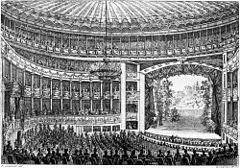
Source: https://ru.wikipedia.org/wiki/%D0%91%D0%BE%D0%BB%D1%8C%D1%88%D0%BE%D0%B9_%D1%82%D0%B5%D0%B0%D1%82%D1%80_(%D0%A1%D0%B0%D0%BD%D0%BA%D1%82-%D0%9F%D0%B5%D1%82%D0%B5%D1%80%D0%B1%D1%83%D1%80%D0%B3)
Outside :
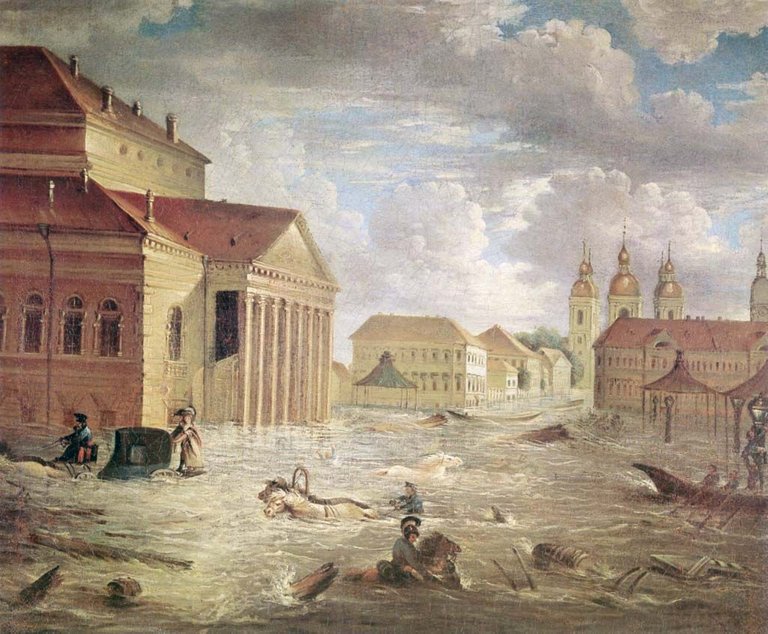
Source: https://ru.wikipedia.org/wiki/%D0%91%D0%BE%D0%BB%D1%8C%D1%88%D0%BE%D0%B9_%D1%82%D0%B5%D0%B0%D1%82%D1%80_(%D0%A1%D0%B0%D0%BD%D0%BA%D1%82-%D0%9F%D0%B5%D1%82%D0%B5%D1%80%D0%B1%D1%83%D1%80%D0%B3)#/media/File:7_%D0%BD%D0%BE%D1%8F%D0%B1%D1%80%D1%8F_1824_%D0%B3%D0%BE%D0%B4%D0%B0_%D0%BD%D0%B0_%D0%BF%D0%BB%D0%BE%D1%89%D0%B0%D0%B4%D0%B8_%D1%83_%D0%91%D0%BE%D0%BB%D1%8C%D1%88%D0%BE%D0%B3%D0%BE_%D1%82%D0%B5%D0%B0%D1%82%D1%80%D0%B0.jpg
In 1921 a special government commission, examining the Theatre building, found its condition to be catastrophic. It was decided to undertake emergency repairs under the direction of architect Ivan Rerberg. It was at this time that the foundations under the semi-circular auditorium walls were reinforced, the cloakrooms overhauled, the staircases replanned, new rehearsal rooms and dressing-rooms created. In 1938 a major reconstruction of the stage was carried out.
At 4 p.m., on 22 October 1941, a bomb fell on the Bolshoi Theatre building. The shock wave passed obliquely between the portico columns, went through the facade wall and did considerable damage to the Lobby. Despite the wartime hardship and the severe cold, restoration work on the Theatre was initiated in winter 1942. And by autumn 1943, the Bolshoi Theatre had again opened its doors to the public with a production of Glinka's opera A Life for the Tsar from which the monarchical stigma had been erased and its patriotic and popular appeal acknowledged though, true, in order to achieve this, the libretto had to be revised and the opera given a new politically correct title – Ivan Susanin.
It's look in 20th century:
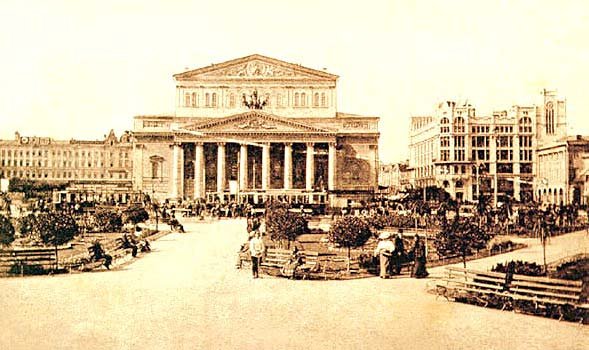
Source: http://megabook.ru/media/%D0%91%D0%BE%D0%BB%D1%8C%D1%88%D0%BE%D0%B9%20%D1%82%D0%B5%D0%B0%D1%82%D1%80%20(%D0%B2%20%D0%BD%D0%B0%D1%87%D0%B0%D0%BB%D0%B5%2020%20%D0%B2%D0%B5%D0%BA%D0%B0)
From July 2005 to October 2011 the theatre was closed for restoration. Repairs were initially estimated at 15 billion rubles ($610 million) but engineers found that more than 75% of the structure was unstable, and as a result the cost estimate jumped to 25.5 billion rubles (app. $850 million).
The renovation included an improvement in acoustics, to attempt to replicate the sound believed to have existed in pre-Soviet times, and the restoration of the original Imperial decor.[2] The building's foundation and brickwork were thoroughly reset. Inside, the entire space was stripped from the bottom up. The 19th-century wooden fixtures, silver stage curtain and French-made red velvet banquettes were removed for repair in specialist workshops. Outside, on the top of the façade, the double-headed eagle of the original Russian coat of arms was installed in the place where the Soviet hammer and sickle had been mounted for decades.
Finally, on 28 October 2011, the Bolshoi Theatre re-opened with a concert featuring international artists and the ballet and opera companies.
Nowadays you can witness this:
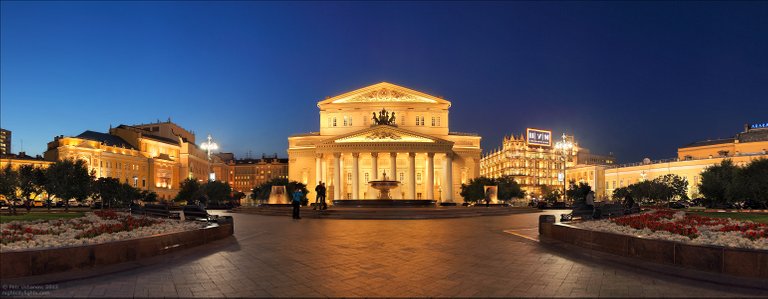
Source: https://pikabu.ru/story/bolshoy_teatr__rossiyskiy_feniks_vosstayushchiy_iz_pepla_4632219
More words about it....
Bolshoi theatre lived a long life, i think, here i can list most famous operas, ballet prefomances: Tchaikovsky's "Swan Lake" ( which always associates with this theatre) "The Voyevoda" and "Mazeppa" , Modest Mussorgsky's "Boris Godunov"
Rachmaninoff's "Aleko" and "Francesca da Rimini", Nikolai Rimsky-Korsakov's opera "The Maid of Pskov", Dmitri Shostakovich's opera "Lady Macbeth of the Mtsensk District" and so on. Architecture of building blinds eyes of visitors, such beauty is unique and fascinating. My vocabulary wont let me express its beauty, so ill use easier way by showing pictures ;)
Here you can see main stage of Bolshoi Theatre :
Source: http://www.bileti-v-teatr.ru/teatri-moskvi/bolshoy-teatr.html
Famous "Swan Lake" of Tchaikovsky:
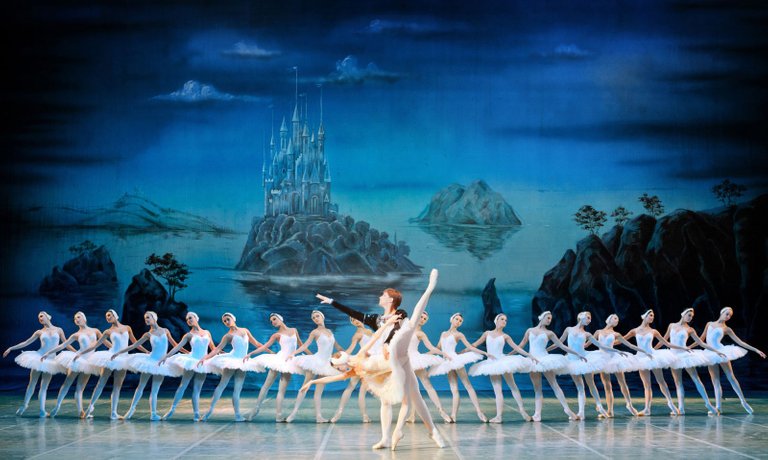
Source: https://telegraf.by/2015/04/288545-bolshoi-teatr-belarusi-s-23-po-26-aprelya-predstavlyaet-programmu-ko-dnyu-rojdeniya-petra-chaikovskogo
Opera "Boris Godunov":
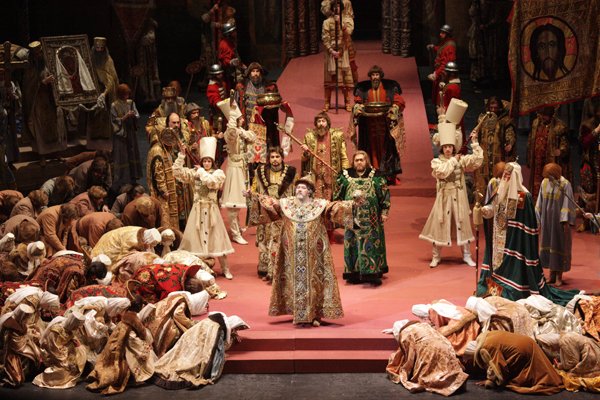
Source: http://www.bolshoi.ru/performances/24/
To feel and understand more cultural source of Russia you cant just watch Tv or read it from papers, the only way is to visit and see at least opera with your own eyes.... About prices, they range from as low as 200 rubles for standing-room-only places in the upmost gallery to about 18000 rubles in the front row of the stalls, but it worth visiting :)
If you got interested, you can check sources that i used to gather information about it, share your thoughts in comments and upvote if you liked this post :)
Here links:
http://www.bolshoi.ru/en/
https://en.wikipedia.org/wiki/Bolshoi_Theatre
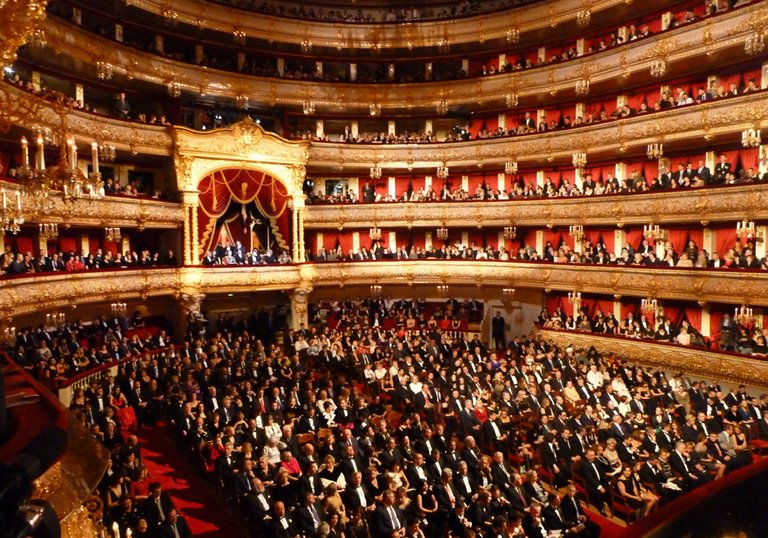
click here!This post received a 1.5% upvote from @randowhale thanks to @denis231! For more information,
@denis231 got you a $2.61 @minnowbooster upgoat, nice! (Image: pixabay.com)
Want a boost? Click here to read more!